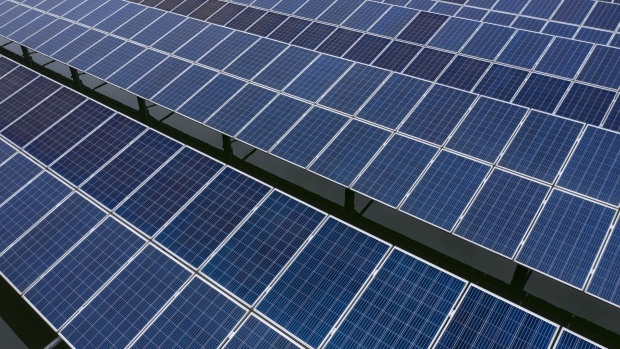Chinese solar firms hit by EU probes in new test of subsidy law
The European Union started probes into bids by Chinese firms for a Romanian solar park, in the latest test of a freshly minted law aimed at preventing state-funded companies from abusing their financial muscle to fend off EU rivals.
The European Commission said Wednesday it’s investigating ENEVO Group including LONGi Solar Technologie GmbH, a unit of the world’s second most valuable solar energy firm. It also began a separate probe into state-owned Shanghai Electric UK Co. Ltd. and Shanghai Electric Hong Kong International Engineering Co. Ltd. The investigations relate to a 110 megawatt solar park, which is partially financed through the EU.
The move comes as the EU grows increasingly concerned that its clean tech industries are being undercut by Chinese companies, which benefit from various levels of state support. The 27-nation bloc is moving closer to imposing additional tariffs on Chinese electric vehicles following an inquiry started in October. It has also taken steps to introduce sustainability and resilience criteria in auctions for renewables, allowing local production to be favored.

“Solar panels have become strategically important for Europe: for our clean energy production, jobs in Europe, and security of supply,” said Thierry Breton, the EU’s internal market commissioner. The probes “aim to preserve Europe’s economic security and competitiveness.”
The EU’s solar industry is reeling even as record numbers of solar panels are installed, with cheap Chinese imports hugely undercutting the domestic manufacturing base. Still, the bloc is weighing carefully any trade defensive measures over fears it could jeopardize the bloc’s ambitious target to cut emissions by 55% this decade.
The EU investigations are the second of their kind under the EU’s foreign subsidies regulation. The first saw a Chinese company abandon a a €610 million ($660 million) Bulgarian railway tender after an investigation got underway.
The China Chamber of Commerce to the EU said its “gravely concerned about the consecutive in-depth investigations against Chinese enterprises” under the EU law.
The way the regulation was framed places “undue burdens on enterprises but also potentially discriminate against Chinese enterprises,” the group said. “This situation is distorting the level playing field for Chinese enterprises operating in the EU.”
Similar Stories
Daphne Technology and Williams secure DOE grant to advance methane emission reduction technology
Daphne Technology, in partnership with Williams, has announced the award of a grant worth nearly $6M from the U.S. Department of Energy's (DOE) Methane Emissions Reduction Program (MERP).
View Article
Solar Prize Round 8 semifinalists & power up contest winners
View ArticleBiofuel can deliver significant GHG emissions reductions but future uptake could be hampered by supply, says DNV
According to DNV’s latest white paper “Biofuels in Shipping”, key biofuels like FAME and HVO have great potential for reducing greenhouse gas (GHG) emissions and supporting compliance with maritime regulations,…
View Article
U.S. wholesale electricity prices were lower and less volatile in 2024
View Article
Blue Water enables dedicated CO2 carrier solution between Royal Wagenborg and INEOS for Greensand Future project
View Article
The eighth U.S. liquefied natural gas export terminal, Plaquemines LNG, ships first cargo
View ArticleGet the most up-to-date trending news!
SubscribeIndustry updates and weekly newsletter direct to your inbox!





